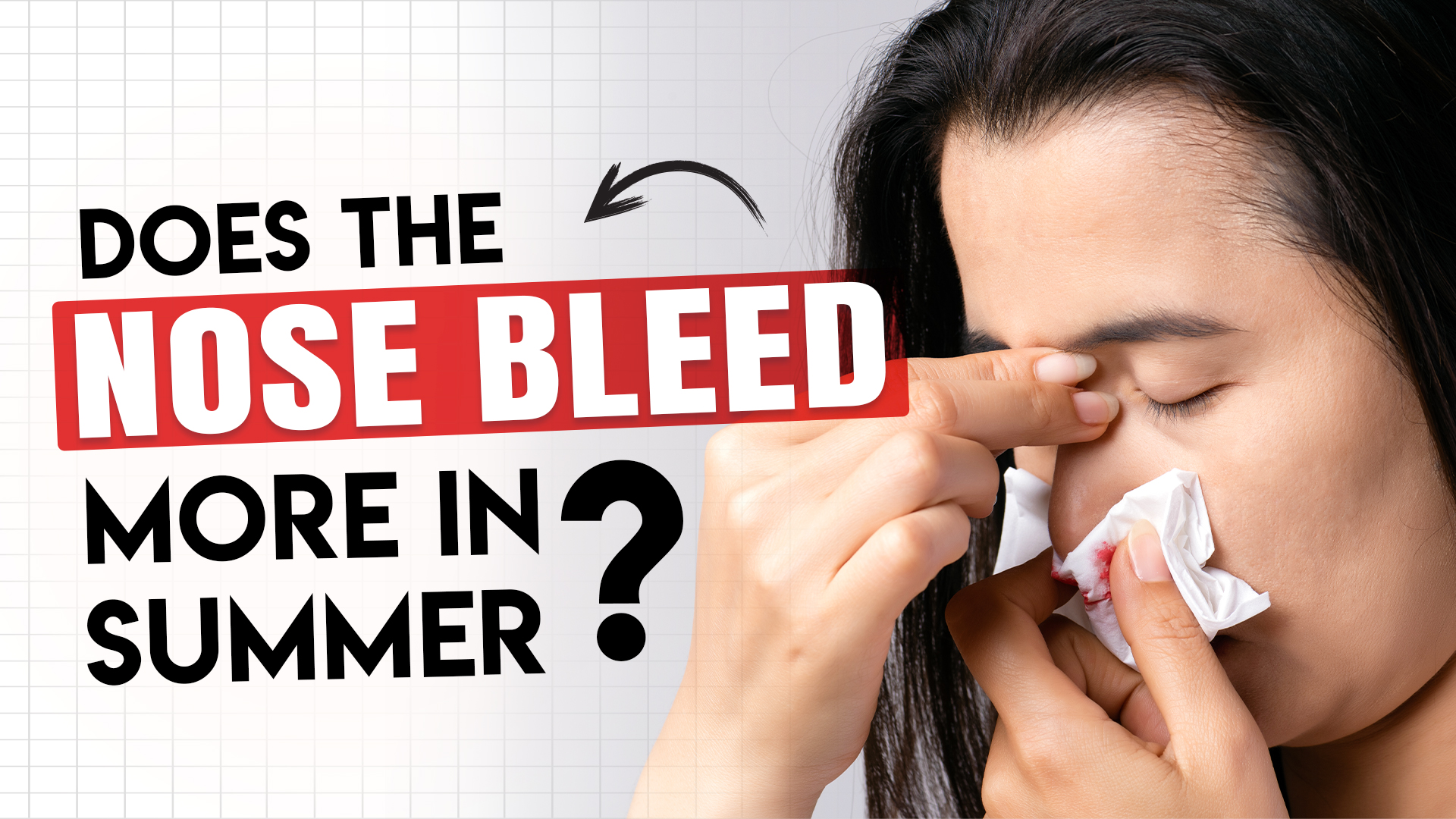Summer Sneezes and Bloody Breezes: Understanding Nosebleeds in the Heat
Verified By Dr. Bhavya B.M | 27-Apr-2024
Summer is a time for fun in the sun, but for some, it can bring an unwelcome visitor – nosebleeds. These sudden bursts of blood from the nose can be alarming, but understanding the reasons behind them can help you stay calm and manage them effectively. So, why do these bloody noses seem to coincide with the scorching summer months?
Table of Content
Nosebleeds (medically known as epistaxis) in summer can be attributed to various factors such as dry air, dehydration, allergies, and exposure to extreme heat. The combination of these factors can lead to the drying and cracking of the delicate blood vessels in the nasal passages, resulting in nosebleeds.
- Dry Air: Our nasal passages have a moist lining that helps trap dust and irritants. However, during the summer, lower humidity levels can dry out this lining, making it more prone to cracking and bleeding.
- Hot Weather: Increased temperatures can dilate the blood vessels in your nose. When these dilated vessels come under any pressure, such as from picking your nose, blowing your nose too forcefully, or even straining during exercise, they can rupture and cause a nosebleed.
- Sunburn: Dehydration caused by sunburn can affect the entire body, including the nasal passages.
- Allergies: Seasonal allergies can irritate the nasal lining, leading to inflammation and an increased risk of bleeding.
- Swimming in Chlorinated Pools: Chlorine can irritate and dry out the nasal lining, especially if you have sensitive skin.
Dr. Bhavya B.M, Consultant ENT Surgeon at Kailash Hospital, Dehradun, elaborates: "Dry air and hot weather create a perfect storm for nosebleeds. The combination dehydrates the nasal passages and increases blood flow, making the delicate tissues more susceptible to bleeding."
Also read: Learn How to Pass Kidney Stones and Prevent Future Ones
By understanding the triggers, you can take steps to prevent nosebleeds during the summer:
- Hydration is Key: Drink plenty of fluids throughout the day to keep your body and nasal passages well-hydrated. As a general guideline, aim for eight glasses of water daily. However, your individual needs may vary depending on your activity level, climate, and overall health. If you sweat a lot during exercise or live in a hot, dry climate, you may need to drink even more fluids to stay adequately hydrated. Consult your doctor for personalized recommendations.
- Moisturize the Air: Use a humidifier at home, especially at night, to add moisture to the air and prevent your nasal passages from drying out.
- Limit Time in the Sun: Avoid prolonged sun exposure, especially during the peak heat hours of the day.
- Manage Allergies: Talk to your doctor about allergy medications if you experience seasonal allergies.
- Avoid Irritants: Limit exposure to smoke, dust, and other airborne irritants.
- Gently Does It: Avoid picking your nose or blowing it too forcefully.
- Saline Spray: Use a saline nasal spray to moisten the nasal passages.
If a nosebleed occurs, it is important to remain calm and follow proper steps for treatment.
- Sit Upright: Lean forward slightly and pinch the soft part of your nose firmly for 10-15 minutes. Apply constant pressure, breathing through your mouth.
- Apply Cold: Place a cold compress on your forehead or the bridge of your nose to help constrict the blood vessels.
- Avoid Picking or Blowing: Resist the urge to pick your nose or blow it forcefully, as this can worsen the bleeding.
- Relax: Stay calm and avoid straining.
Dr. Bhavya B.M reminds us to stay calm: "Most nosebleeds are minor and stop on their own with proper pressure. However, if the bleeding continues for more than 15 minutes or is severe, it's crucial to seek medical attention."
Also read: Stay Ahead of Malaria: Proactive Prevention Tips and Techniques
If your nosebleeds are frequent, severe, or accompanied by other symptoms like facial pain, fever, or dizziness. Dr. Bhavya B.M emphasizes “It's important to consult an ENT (Ear, Nose, and Throat) specialist. They can identify the underlying cause and recommend appropriate treatment. Kailash Hospital in Dehradun offers comprehensive ENT services, ensuring prompt and effective management of nosebleeds and other ENT conditions.”
Here's a breakdown of some key signs that warrant a visit to an ENT specialist:
- Frequent Nosebleeds: If your nosebleeds occur more than two or three times a week, consult an ENT specialist. This could indicate an underlying issue that needs investigation.
- Severe Bleeding: If the bleeding is heavy and doesn't stop after 15-20 minutes of applying constant pressure, seek immediate medical attention. This could be a sign of a more serious problem.
- High Blood Pressure (HTN): Uncontrolled high blood pressure can increase the risk of nosebleeds. If you have a history of HTN and experience frequent nosebleeds, consult your doctor to ensure your blood pressure is well-managed.
- Medication Use: Certain medications, like blood thinners (anticoagulants) and aspirin, can make you more prone to bleeding, including nosebleeds. If you're taking these medications and experience frequent or severe nosebleeds, talk to your doctor. They may need to adjust your medication dosage or consider alternative options.
- Bleeding Disorders: Some medical conditions like hemophilia can affect blood clotting and increase the risk of nosebleeds. If you have a known bleeding disorder and experience a nosebleed, consult your doctor immediately.
Nosebleeds during summer can be distressing, but understanding the causes and implementing preventive measures can help minimize their occurrence. By staying hydrated, protecting the nasal passages from dry air and sun exposure, and seeking timely medical attention when needed, individuals can effectively manage nosebleeds during the summer months. Consultation with an ENT specialist like Dr. Bhavya B.M at Kailash Hospital, Dehradun, ensures proper diagnosis and treatment, promoting overall nasal health and well-being.



 +91-9711918451
+91-9711918451
 international.marketing@kailashhealthcare.com
international.marketing@kailashhealthcare.com







